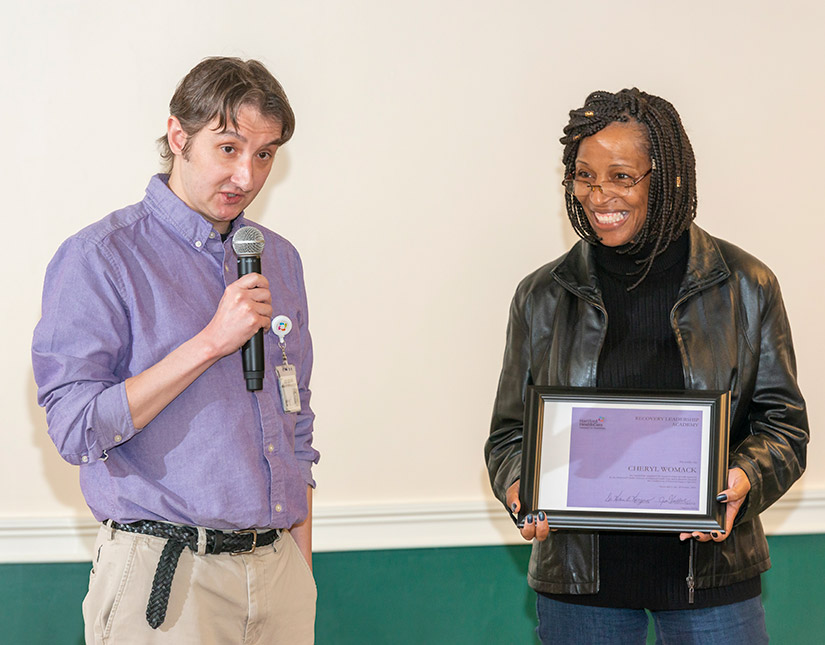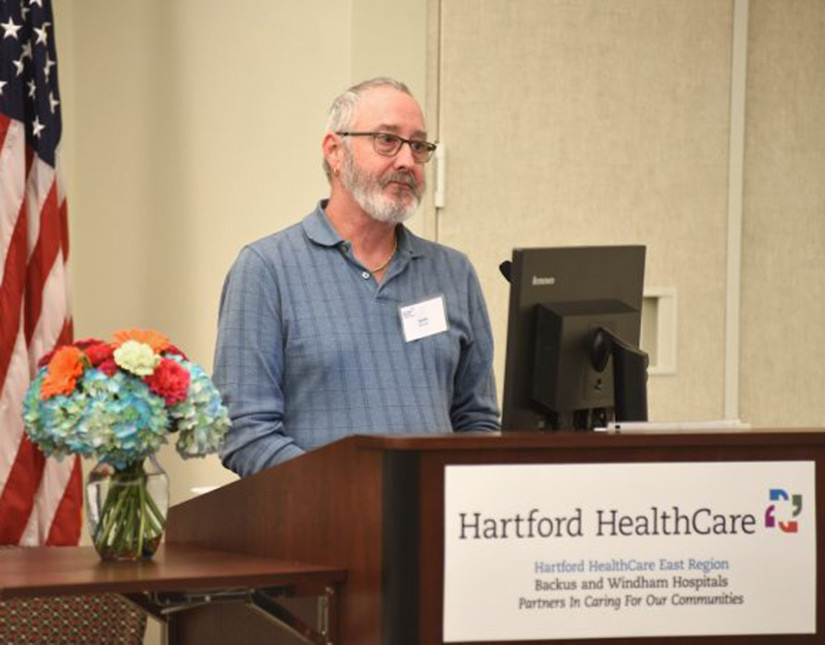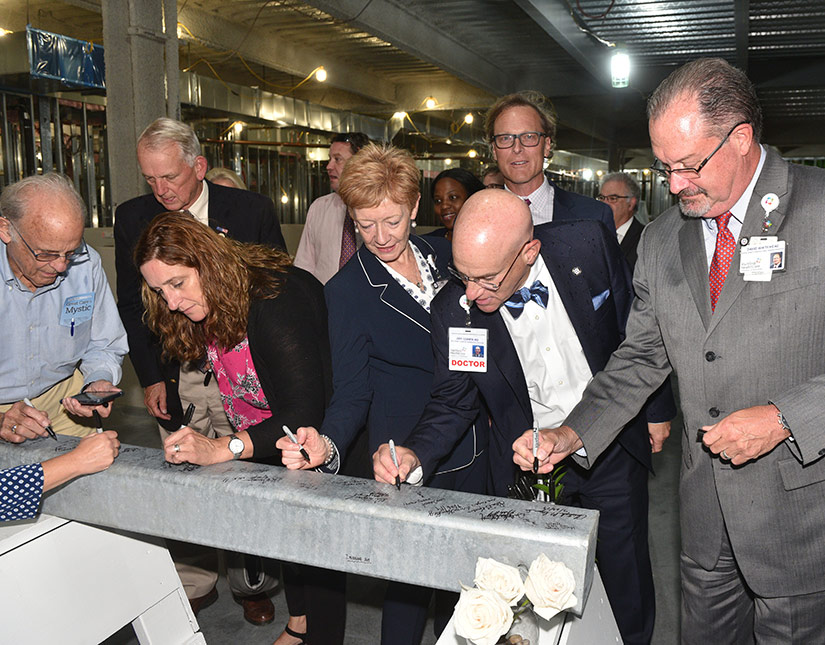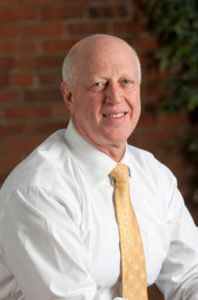Points of Pride
Blending care for behavioral and physical needs
As if struggling with chronic medical illness is not challenging enough for young adults, research shows they are also far more likely to develop mental illness than those not facing physical challenges or limitations.
A two-year research study by the Cambridge Health Alliance followed 48,000 youth between ages 6 and 25 who did not have a mental health diagnosis. Approximately 14 percent had a chronic physical health problem requiring ongoing treatment or posing limitation on their lives. Youth with chronic health ailments, such as asthma or diabetes, are 51 percent more prone to anxiety, 70 percent more prone to mood disorders like depression and 54 percent more prone to behavior disorders.
“This aligns perfectly with what we’ve been seeing in our work with youths,” said Dr. David Bendor, clinical coordinator of the new Young Adult Medical Track at Hartford HealthCare’s Institute of Living. “Significant medical conditions often cause mental health challenges for these young people and, sadly, the effect of not addressing mental health issues is that it becomes more challenging for young adults to ensure that their medical needs are met. They may skip medications or medical appointments, or take other risks with their health.”
At the Young Adult Medical Track, the team — two psychologists, a psychiatrist and a nurse — work collaboratively with the young adults and their primary care, subspecialty and mental health providers to integrate care and support for both the body and mind.
“Significant medical conditions often cause mental health challenges for these young people” –Dr. David Bendor
The program combines individual, group and family therapy with medication management. Participants interact with peers facing similar struggles to explore the losses or limitations posed by their medical conditions while navigating the transition to adult roles. They attend three groups a day, three days a week for six to eight weeks.
—Susan McDonald
Leading through recovery
The Hartford HealthCare Behavioral Health Network (BHN) celebrated its first-ever Recovery Leadership Academy graduation in October at the Institute of Living in Hartford.
Recovery Leadership Academy — an 80-hour training — prepares people in recovery from mental illness and addiction to become certified recovery support specialists. These specialists draw on personal experience to provide support to those currently in treatment.
I’ve seen it over and over, and now research is proving it works as well,” said Pat Rehmer, president of the BHN. “People can and do recover, and people who are in recovery can help.”
—Susan McDonald

Above: Joe Voelker, left, presents a certificate to Cheryl Womack. Left: Lynnette Stokes, left, shares a hug with Karen Kangas.
Photos by Chris Rakoczy
For information on joining a future Recovery Leadership Academy, visit hhcbehavioralhealth.org
Man visits hospital, wins prize!
A Hartford man had reason to celebrate after leaving Hartford Hospital in late summer. According to CT Lottery, Justin Rodriguez won $15,508 playing the Play4Day game with a lottery ticket purchased in the Auxiliary Store. It wasn’t the first time a big payday originated at the shop. Last year, a lotto player won $10,000 there.
—Pamela Cruz
Patient ‘lucky to be alive’
After 40 years of often heavy drinking, Keith Bunnell was diagnosed with pancreatitis and told if he didn’t stop he’d be dead in six months. He quit for a week.
Four months later, the electrical designer and father of four had a worse bout of pancreatitis. He spent four months hospitalized after three surgeries and a LIFE STAR flight to Hartford Hospital. Then, at home, he had a heart attack.

Keith Bunnell shared his recovery story at Natchaug Hospital’s annual reception.
Photo by Jeff Evans
“None of this was enough to stop me from drinking,” said Bunnell, speaker at Natchaug Hospital’s annual reception. “This disease is horrible.”
On the last of six trips to the Backus emergency department, staff said, “We can’t help you anymore. Only you can help yourself.” A Natchaug recovery support specialist in the ED vowed to get him into a substance abuse program. The next day, he got a call from Rushford in Middletown asking if he could be there at 9 a.m. — the time he’d usually be at the package store as it opened.
Something clicked, though. He spent five days in Rushford detox, 21 days in its residential facility and more in Natchaug’s CarePlus intensive outpatient program, where he learned coping skills for recovery.
There’s no more deceiving his colleagues, family or himself. He is honest about his disease and feels healthier than he has in years.
“They kept telling me I could make it. I finally began to believe that,” he said. “I am lucky to be alive.”
—Shawn Mawhiney
Jeff Evans
Bringing more expertise and access to Mystic
More than 75 community members, officials and Hartford HealthCare leaders braved the rain for a beam signing event at the site of the future Mystic HealthCenter.
The 47,000-square-foot development off I-95 and Coogan Boulevard in the Mystic section of Stonington is scheduled to open in winter 2020 and will include:
• Neuroscience services for movement disorders, neurosurgery and pain management
• Cardiology services including vascular surgery, electrophysiology and heart failure specialists; diagnostic testing, such as stress, echocardiogram and CT; a vascular lab and pacemaker clinic.
• Imaging (X-ray, MRI, CT and ultrasound)
• Physical therapy and rehabilitation services
• Primary care and concierge medicine
—Steve Coates

Officials sign a steel beam that is part of the new Mystic facility.
Photos by Jeff Evans
View a live construction cam at HartfordHealthCare.org/Mystic
The new reality for less pain
Hartford HealthCare Ayer Neuroscience Institute’s Dr. Adrian Hamburger offers virtual reality (VR) technology as non-narcotic pain management in his Westerly, R.I., office.
In two weekly treatments lasting about 20 minutes each, patient Christine Chiappone dons a VR headset in an exam room outfitted with computer hardware and sensors. As a result, pain she reported at 8 to 10 dropped to 2 or 3 and she could be more active.
“I have pain-free days now,” she says. Dr. Hamburger, who will see patients in the new Mystic HealthCenter set to open in 2020, is one of only a few doctors on the East Coast using VR as a regular treatment method for pain management.
—Elissa Bass
To read more, visit healthnewshub.org and see the virtual reality goggles in action at hartfordhealthcare.org/goggles
CHH leader leaps into action
 As Charlotte Hungerford Hospital president, Dan McIntyre comes in contact with patients regularly, but never like the morning of October 22.
As Charlotte Hungerford Hospital president, Dan McIntyre comes in contact with patients regularly, but never like the morning of October 22.
On the way to work, McIntyre came upon a car crash on Route 44 in New Hartford where a vehicle had flipped on its side with a woman trapped inside. With an unidentified good Samaritan, he pulled her out of the wreckage.
“He’s an angel,” said the driver, Trish Hill, who said she lost control of her vehicle when another car veered into her lane.
The fact that McIntyre took a different route to work that morning made the rescue even more miraculous. He credited his career and life experiences with enabling him to be there for people when they need it.
“I can’t thank them enough,” said Hill, who was banged up but otherwise OK.
—Shawn Mawhiney
